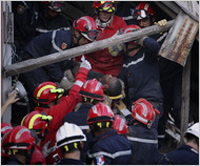Haiti's Officials Estimate Victims of the Earthquake
Haiti’s government provided a preliminary assessment of the earthquake’s body count on Saturday, putting it at more than 150,000, and declared that the search for survivors trapped in the rubble would soon be coming to an end.

Marie-Laurence Jocelyn Lassegue, Haiti’s culture and communications minister, said that 150,000 bodies from the streets had been collected and buried in the past 11 days.
She also said that there were at least 250,000 people homeless and that 200,000 residents of Port-au-Prince and its outskirts had moved to the provinces since the earthquake hit.
The number of homeless appears to be in flux. Haiti’s Directorate for Civil Protection estimated last week that one million people had been displaced by the quake on Jan. 12. Recent estimates from the International Organization for Migration show that 370,000 people are living in “improvised shelter,” outside largely in camps without access to water, sanitation or food.
Laurent M. Dubois, a history professor at Duke University who specializes in Haiti, said that the government — which struggled to compile comprehensive data even before the earthquake — appeared to be geared toward showing people that it was seriously trying to gauge the disaster’s impact and challenges.
Rescues, however, have been easier to count. The numbers are smaller, and the moments more joyful. As of Saturday morning, international rescue teams had pulled 132 people alive from the rubble.
The government said Saturday that rescue teams could continue to search if they know of survivors, but that, realistically, it was unlikely that anyone else would be found alive.
New York Times has contributed to the report.
Subscribe to Pravda.Ru Telegram channel, Facebook, RSS!





